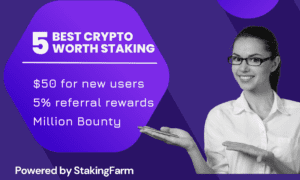John Iadeluca is the founder of Banz Capital, a Hedge fund, Offering high net worth investors exceptional risk-adjusted returns from a managed portfolio. John will share with us in this interview, the unbiased services Banz Capital will be providing and the opportunities in new digital markets.
1. Please tell us your name and about yourself. How did you get started with trading?
My name is John Iadeluca. I got involved with trading stocks and forex when I was around 12. I learned how to program when I was 11 and financial programming really interested me which the entirety of Wall Street seems to be shifting towards as of recently. When I was 17 I started working with blockchain development and saw the potential with trading crypto algorithmically after I built a Bitcoin faucet. I was never really good at math, but when I learned about trading quantitatively I couldn’t stop learning about it because I found it so interesting. I noticed I had the ability to generate profit while the entire market was losing, so I immediately dived deeper in. Those were my beginnings, anyway.
2. What is Banz Capital?
Banz is a quantitative digital asset based hedge fund, that focuses on unique and believably undiscovered methods. The quantitative part speaks to the fact that digital assets can be analyzed in different ways than stocks because of their nature. Exchanges that you trade cryptos on have interactive API’s, that if you know how to work with, can yield new viewpoints. The arbitrage emphasis is done in a few ways, primarily only through bots because they can execute trades in milliseconds. Humans can’t do that.
In the early 2000s, high frequency traders would be able to purchase shares of a stock on one ECN and sell on another. I took that concept and applied it to what many considered a broken market. Since digital assets function through virtual exchanges and pools, you can do the exact same thing. All you do is replace the ECN variable. Buy on one pool for $1 and sell on another for $1.10. That’s 10% profit, and downside is limited. Manually, that’s impossible. Utilizing bots for that is a different story. I’ve been working with blockchain projects for over a year now for a firm on Wall Street and finance can statistically thrive with blockchain engineers. That’s the other emphasis that Banz focuses on; immutable intrinsically-linked assets. They don’t suffer from the volatility of the regular markets, yet maintain new opportunity. We form partnerships with companies and exchanges to enable larger scale investments, ones that aren’t possible without a legally recognized private fund.
3. Would you like to tell us about your investment portfolio?
Sure, we allocate approximately over 85% to quantitative and algorithmic trading, and 15% or less for immutable smart contract-backed assets. My biggest play recently was Universa, which I developed a case study for. They launched their blockchain’s mainnet version last week, and saw 500% increase from the original price. I got in at $0.01. I think it’s at about $0.05 at the moment, despite the entire market losing more than half its value. I believe that making profit when the market bleeds is essential for hedge funds. Otherwise, why would people trust you with money and let you take a fee?
I believe the portfolio aims at being different than other funds. Anyone can buy Bitcoin and claim they’re a genius when price goes up, but the ones that profit during a bearish market are the ones that survive. If you can make money when everyone else loses money, people start listening.
The portfolio isn’t something that was put together in 5 minutes; it takes months of diligent research, tweaking of programs, analysis, partnerships, and more to ensure you make good plays.
4. Who has access to your fund and what are the requirements?
It functions as any other hedge fund, just emphasizes different strategies than most, but the structure is there. I formed the fund through Capital Fund Law Group PC in New York. The hedge fund is only available to accredited level investors and above. This means you have to make over $200,000 a year, or $300,000 with a spouse. Or have a net worth of at least $1 million.
5. What is the market size of Global cryptocurrency investment? What’s your prediction for it?
It stands at around $300 billion at the moment, but I think a differently structured cryptocurrency market will hit $1 trillion. The one thing that has damaged the market was the exponential growth of speculation relative to actual value. There were promises of trillion dollar disruptions, but people just got too overwhelmed. Networks got congested too fast, essentially, the technology wasn’t ready for the manpower. The question is by the time the technology can handle the traffic, will it even be useful anymore?
If you understand blockchain engineering and development, you understand that companies, institutions, financial firms, even governments lose billions by not integrating digital ledgers in most cases. People get it confused, though. That doesn’t mean they need to host an ICO, that does not mean they need to start using cryptocurrency. They do need ledger-based systems. Financial statistics prove that. They just don’t have the right resources. The ones that do, though, are excelling.
Overall, I doubt this is something that just dies out. Even if it does though, it’d probably be beneficial for our strategies. That’s the thing, when I was structuring the strategies and the fund, I wanted something that thrived when other people did, but thrived when markets bled also. I think there’s so much undiscovered opportunity with that.
6. What do you think about the recent crypto market slump?
I think it’s healthy. This past December it was like everyone was becoming a millionaire overnight, it was sort of scary. Now it’s more about who’s putting in the most effort and research, who’s trading the most effectively, and who’s algorithms are working. There’s a lot of uncertainty, but now you’re seeing the huge Wall Street giants quietly getting involved. George Soros’ family office just approved crypto trading, but they’re notorious for shorts and quant trading against the current. That was one of the biggest affirmations for my fund.
VC’s are pouring money into blockchain technology behind the scenes. Deutsche Bank, Credit Suisse, Goldman Sachs all have veterans leaving to form their own funds or blockchain ventures. Santander just released their Ripple test project. It’s a cool time period. The market was sort of in a speculative area, which is now stabilizing. Like during the dot com bubble, once the dust settled from the bubble, you had giants that emerged like Amazon. It took some time, but look at their decade-long growth vectors? It’s incredible.
I’m still bullish about the overall crypto market, but ones that actually have value. There’s a lot of projects that add ‘decentral’, ‘global’, and ‘blockchain’ to their project description run a crowdsale, and people dump millions for it. That’s the area that needs to get sorted out before anything, which is happening slowly but surely.
7. What are the best cryptocurrencies or ICO’s to invest in now and why?
I’m going to say Tron because the amount of effort that goes into their tech from the development team is really promising. As a development platform, Ethereum actually serves a real purpose right now, and if you’re a programmer you know how incredible Solidity is. It’s literally like programming a monetary system. The system is reliable, but as far as Ether itself, that’s a different story. Universa (UTN) integrated with the Malaysian government where welfare distributions were put on the blockchain; if anyone granted welfare used it for anything like cigarettes, or not welfare’s true intention, the transaction is denied. I got in early with them, made over 5x return in a falling market without leverage, and it taught me a lot. There’s no one best crypto or ICO; assets change in this market so quickly.
As far as ICO’s, I can’t name any specific ones because of contracts I’m under, but look for regulation, real team members, real products, usable networks, and ensure legitimacy. Don’t fall for speculative projects, especially unregulated ones.
8. What is your advice for new traders or funds?
Make sure you do your research beforehand and have the money to spend on it. Also, make sure you have a strategy clear before anything. Build a track record, even if you’re young, keep working. Form connections and try to network as much as possible. Being good at cold calling helps that a lot. If you’re entering a new market, make sure your legal counsel is top-tier; I believe it’s worth it to drop more money for a reliable legal team instead of facing consequences down the line.
Also, if you’re trading don’t get emotional about a trade. Warren Buffet said that the markets don’t care about you, and that always stuck with me. I never get emotional about trading, I profit off of it and move on. You can’t get stuck on a crypto (or stock) because it goes down; it’s going to move regardless of whether or not you think it’s the greatest project in the world or not. You could be 99% sure about a play and be dead wrong and lose 80% within an hour in crypto, so be aware of that. If you don’t adhere to that, you’ll lose. Make profit, and move. Cut losses quick if the latter.
9. Speaking of Warren Buffett, what do you think of institutional investors that talk negatively about crypto?
I think they have the right to speak their opinions. It doesn’t really affect me, though. The technology’s there, and that’s all I really care about. They grew up with the absolute opposite standards in mind, so I never look down on people like that. It’s just new to them.
As long as the tech is there, I can profit off of it whether it goes up or down. Buffet spoke down on tech stocks, and now has one of the largest shares in Apple. Emotions and attitudes change, so I don’t worry.
10. If I want to make at least $1 Million USD from Cryptocurrency within 1 year, what are the best ways to achieve this?
Do a ton of research. Chances are you’re not going to make a million within a year trading crypto unless you’re really good at it, so keep learning. Learn the markets and put in tons of hours studying. Also, try not to give up, which is really easy to do with trading. I lost a ton of money when I first started trading but I kept learning and eventually made multiple times more than what I lost. That’s because I found my niche, and worked to refine it. Just learn how the markets work and don’t get emotional. Some of my first algorithms were god-awful, but I progressed.
Part of success in trading is to be lucky too, there’s no doubt about that. Figure out the odds of something happening and play the odds. The option that exceeds 50% is more likely to succeed, right? So play it like that. Be smart too. There’s a quote that says ‘There’s a difference between a smart bet and a winning bet’, and I always remember that when I’m trading or investing. Make smart plays.
11. How do you see the future of this market?
Lots of hedge funds are going to enter, but adaptable ones will survive. You’re already seeing this, because from a programmatic standpoint, it’s so much more efficient to high speed trade crypto than it is a stock, at least from my experience. You’re already seeing this with hedge funds entering left and right, despite the huge price decreases. I think the markets are going to be heavily regulated within the future as well, which is a good thing. Funding will continue to grow for efficient blockchain projects.
I think blockchain’s going to start to see the corners of most business models because of its immutability. I hope a regulatory framework detailing mandatory blockchain systems is deployed, which I think is inevitable, just might take some time.
Schools and universities are going to start updating curriculums. I’ve been contacted by MBA programs about developing a course structure for blockchain, which is really interesting. Blockchain developers are paid anywhere between $250-300/hour right now because of the shortage of workers. These are people who don’t even have degrees yet. When 20 year olds are being paid $200/hour to code, you’ve got to start paying attention.
12. Is there anything else you’d like to tell our readers?
Try to get involved, or at least learn about technological systems like blockchain. Companies are throwing money at employees that have knowledge in it, because there’s such a lack of workers. Artificial intelligence, computer science, blockchain, and quantitative mathematics are taking over Wall Street, take note of that.
For more information, visit Banz Capital: http://www.banz.capital/



















































